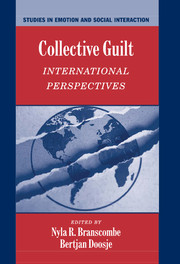Book contents
- Frontmatter
- Contents
- Preface
- List of Contributors
- Collective Guilt
- Section 1 Defining the nature of collective guilt
- 1 International Perspectives on the Experience of Collective Guilt
- 2 The Measurement of Collective Guilt: What It Is and What It Is Not
- 3 The Evocation of Moral Emotions in Intergroup Contexts: The Distinction Between Collective Guilt and Collective Shame
- 4 Collective Guilt in the United States: Predicting Support for Social Policies that Alleviate Social Injustice
- 5 Gender Inequality and the Intensity of Men's Collective Guilt
- Section 2 The Relationship Between Group Identification and Collective Guilt
- Section 3 Consequences for Intergroup Relations
- Section 4 Commentary on the Volume
- Index
- References
1 - International Perspectives on the Experience of Collective Guilt
Published online by Cambridge University Press: 05 January 2012
- Frontmatter
- Contents
- Preface
- List of Contributors
- Collective Guilt
- Section 1 Defining the nature of collective guilt
- 1 International Perspectives on the Experience of Collective Guilt
- 2 The Measurement of Collective Guilt: What It Is and What It Is Not
- 3 The Evocation of Moral Emotions in Intergroup Contexts: The Distinction Between Collective Guilt and Collective Shame
- 4 Collective Guilt in the United States: Predicting Support for Social Policies that Alleviate Social Injustice
- 5 Gender Inequality and the Intensity of Men's Collective Guilt
- Section 2 The Relationship Between Group Identification and Collective Guilt
- Section 3 Consequences for Intergroup Relations
- Section 4 Commentary on the Volume
- Index
- References
Summary
National and other important social groups have histories. Reminders of group history can have important consequences for present-day emotional experience. When people consider some aspects of their group's history, they may feel collective pride and celebrate their group membership, while other aspects of their group's history may evoke collective guilt and a desire to correct the wrongs committed by the ingroup. Such emotional responses need not stem from personal participation in the events but can result when the self is categorized in terms of a shared group membership. Indeed, people's reactions to intergroup events are not usually based on having had a direct role in those events; rather such reactions will be dependent on the social identity that is contextually salient when people are reminded of their ingroup's past actions. Investigation of such group-based emotional experience is a relatively recent development within social psychology, but one that reflects a rapidly expanding interest in the interface between emotions and intergroup relations (see Cairns & Roe, 2003; Tiedens & Leach, 2004; Mackie & Smith, 2002; Pennebaker, Paez, & Rime, 1997).
In this volume, we focus on people's experience of one particular group-based emotional response – collective guilt. Collective guilt stems from the distress that group members experience when they accept that their ingroup is responsible for immoral actions that harmed another group (Branscombe, Doosje, & McGarty, 2002).
- Type
- Chapter
- Information
- Collective GuiltInternational Perspectives, pp. 3 - 15Publisher: Cambridge University PressPrint publication year: 2004
References
- 22
- Cited by



